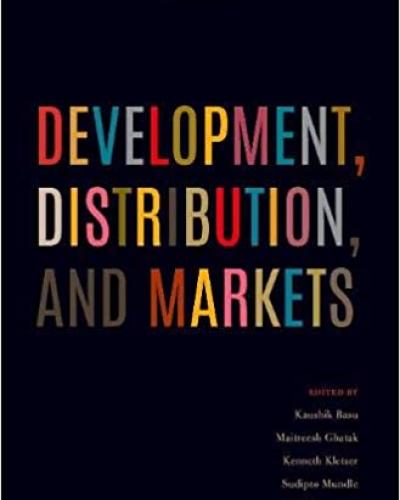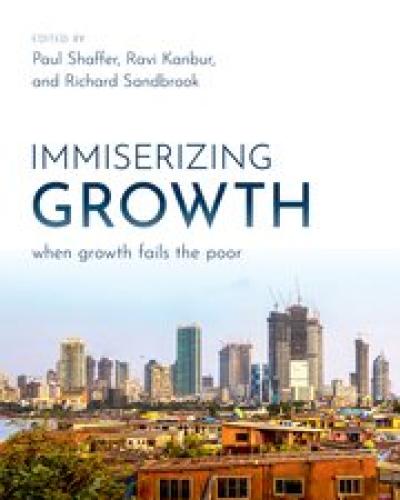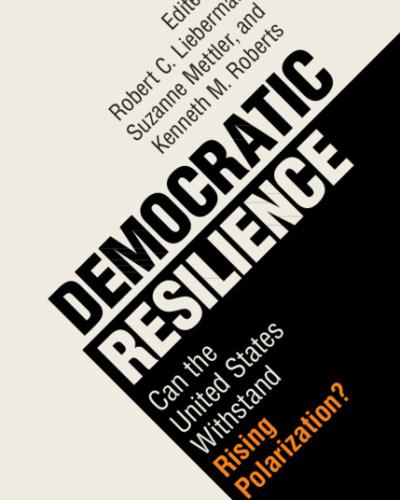Introduction
CSI is based in the Sociology Department in the College of Arts and Sciences, but has more than 100 Faculty Affiliates from around campus. Below is a selection of recent books written and edited by our affiliates.
N'Dri T. Assié-Lumumba
African Renaissance in the 21st Century
The in-depth studies and analyses by specialists in the disciplines represented in this remarkable book confirm my own conviction that the 21st century will be the century of Africa, the African Renaissance. (Full Description)

Solon Barocas
Fairness and Machine Learning
Fairness and Machine Learning introduces advanced undergraduate and graduate students to the intellectual foundations of this recently emergent field, drawing on a diverse range of disciplinary perspectives to identify the opportunities and hazards of automated decision-making. It surveys the risks in many applications of machine learning and provides a review of an emerging set of proposed solutions, showing how even well-intentioned applications may give rise to objectionable results. It covers the statistical and causal measures used to evaluate the fairness of machine learning models as well as the procedural and substantive aspects of decision-making that are core to debates about fairness, including a review of legal and philosophical perspectives on discrimination. This incisive textbook prepares students of machine learning to do quantitative work on fairness while reflecting critically on its foundations and its practical utility. (Full Description)

Christopher B. Barrett
The Economics of Poverty Traps
Edited by Christopher B. Barrett, Michael R. Carter, and Jean-Paul Chavas
"The research in this volume explores the hypothesis that poverty is self-reinforcing because the equilibrium behaviors of the poor perpetuate low standards of living. Contributions explore the dynamic, complex processes by which households accumulate assets and increase their productivity and earnings potential, as well as the conditions under which some individuals, groups, and economies struggle to escape poverty. Investigating the full range of phenomena that combine to generate poverty traps—gleaned from behavioral, health, and resource economics as well as the sociology, psychology, and environmental literatures—chapters in this volume also present new evidence that highlights both the insights and the limits of a poverty trap lens." (Full Description)

Kaushik Basu
Development, Distribution, and Markets
By Kaushik Basu
"This volume is a testament to the breadth and policy relevance of development economics today. It grapples with questions on how to design anti-poverty policies and under what conditions we can expect them to be successful. It concentrates on programmes and policies for India and covers international experience with cash transfer programmes. The work in this area applies core theoretical insights to policy discussions surrounding poverty measurement, income inequality, rural unemployment, and compares alternative growth strategies in terms of their impact on poverty and inequality." (Full Description)

Law, Economics, and Conflict
Edited by Kaushik Basu and Robert C. Hockett
"Kaushik Basu and Robert C. Hockett bring together international experts to offer new perspectives on how to take analytic tools from the realm of academic research out into the real world to address pressing policy questions. As the essays discuss, political polarization, regional conflicts, climate change, and the dramatic technological breakthroughs of the digital age have all left the standard tools of regulation floundering in the twenty-first century. These failures have, in turn, precipitated significant questions about the fundamentals of law and economics." (Full Description)

Policymaker's Journal: From New Delhi to Washington D.C.
By Kaushik Basu
"This book charts the course of Kaushik Basu’s career over seven years, as he moved from the cloisters of academia to the frenetic world of policymaking, first in India as chief economic adviser to the Indian government and after that as chief economist at the World Bank in Washington.
This book is a revised version of the diary that Kaushik Basu kept for seven years. Revised because he often wrote the diary in a hurry at the day’s or even week’s end. He has now inserted some reflections in retrospect, without altering any descriptions of what actually happened." (Full Description)

Reason to Be Happy
By Kaushik Basu
Why do our friends have more friends than we do? How do you book the best available seats on a plane? And if jogging for ten minutes adds eight minutes to our life expectancy, should we still go jogging? The ability to reason is one of our most undervalued skills. In everyday life, the key is to put yourself in the shoes of a clever competitor and think about how they might respond. Whether you are dealing with events on the scale of the Cuban missile crisis or letting go of anger, leading economist Professor Kaushik Basu shows how game theory - the logic of social situations - can help us achieve better outcomes and lasting happiness. Full of fascinating thought experiments and puzzles, Reason to Be Happy is a paean to the power of rationality. If you want to have a good life and even make the world a better place, you can start by thinking clearly. (Full Description)

Angela B. Cornell
The Cambridge Handbook of Labor and Democracy
Edited by Angela B. Cornell and Mark Barenberg
"In this timely handbook, scholars in law, political science, history, and sociology explore the role of organized labor and the working class in the historical construction of democracy. They analyze recent patterns of democratic erosion, examining its relationship to the political weakening of organized labor and, in several cases, the political alliances forged by workers in contexts of nationalist or populist political mobilization. The volume breaks new ground in providing cross-regional perspectives on labor and democracy in the United States, Europe, Latin America, Africa, and Asia. Beyond academia, this volume is essential reading for policymakers and practitioners concerned with the relationship between labor and democracy." (Full Description)

Erin Cumberworth
Multiverse Analysis
Book authored by Cristobal Young and Erin Cumberworth
There are many ways of conducting an analysis, but most studies show only a few carefully curated estimates. Applied research involves a complex array of analytical decisions, often leading to a 'garden of forking paths' where each choice can lead to different results. By systematically exploring how alternative analytical choices affect the findings, Multiverse Analysis reveals the full range of estimates that the data can support and uncovers insights that single-path analyses often miss. It shows which modelling decisions are most critical to the results and reveals how data and assumptions work together to produce empirical estimates. Focusing on intuitive understanding rather than complex mathematics, and drawing on real-world datasets, this book provides a step-by-step guide to comprehensive multiverse analysis. Go beyond traditional, single-path methods and discover how multiverse analysis can lead to more transparent, illuminating, and persuasive empirical contributions to science. (Full Description)

Ronald Ehrenberg
Modern Labor Economics
Modern Labor Economics: Theory and Public Policy, now in its fourteenth edition, continues to be the leading text for one-semester courses in labor economics at the undergraduate and graduate levels.
It offers a thorough overview of the modern theory of labor market behaviour and reveals how this theory is used to analyze public policy. Designed for students who may not have extensive backgrounds in economics, the text balances theoretical coverage with examples of practical applications that allow students to see concepts in action. The authors believe that showing students the social implications of the concepts discussed in the course will enhance their motivation to learn. As such, this text presents numerous examples of policy decisions that have been affected by the ever-shifting labor market.
This new edition continues to offer: a balance of relevant, contemporary examples; coverage of the current economic climate; introduction to basic methodological techniques and problems; tools for review and further study.
This fourteenth edition presents updated data throughout and a wealth of new examples, such as the impact of COVID-19 lockdowns, gig work, nudges, monopsony power in the technology industry, and the effect of machine learning on inequality. Supplementary materials for students and instructors are available on the book’s companion website. (Full Description)

Brooke Erin Duffy
(Not) Getting Paid to Do What You Love
"Profound transformations in our digital society have brought many enterprising women to social media platforms--from blogs to YouTube to Instagram--in hopes of channeling their talents into fulfilling careers. In this eye-opening book, Brooke Erin Duffy draws much-needed attention to the gap between the handful who find lucrative careers and the rest, whose "passion projects" amount to free work for corporate brands.
Drawing on interviews and fieldwork, Duffy offers fascinating insights into the work and lives of fashion bloggers, beauty vloggers, and designers. She connects the activities of these women to larger shifts in unpaid and gendered labor, offering a lens through which to understand, anticipate, and critique broader transformations in the creative economy. At a moment when social media offer the rousing assurance that anyone can "make it"--and stand out among freelancers, temps, and gig workers--Duffy asks us all to consider the stakes of not getting paid to do what you love." (Full Description)

Platforms and Cultural Production
By Thomas Poell, David B. Nieborg, and Brooke Erin Duffy
"Poell, Nieborg, and Duffy explore both the processes and the implications of platformization across the cultural industries, identifying key changes in markets, infrastructures, and governance at play in this ongoing transformation, as well as pivotal shifts in the practices of labor, creativity, and democracy. The authors foreground three particular industries – news, gaming, and social media creation – and also draw upon examples from music, advertising, and more. Diverse in its geographic scope, Platforms and Cultural Production builds on the latest research and accounts from across North America, Western Europe, Southeast Asia, and China to reveal crucial differences and surprising parallels in the trajectories of platformization across the globe." (Full Description)

Peter K. Enns
Hijacking the Agenda: Economic Power and Political Influence
By Christopher Witko, Jana Morgan, Nathan J. Kelly, and Peter K. Enns
"The authors analyze over 20 years of floor speeches by thousands of members of Congress to examine how campaign contributions and independent expenditures on behalf of candidates help set the national economic agenda. They find that legislators receiving more support from business and other wealthy interests were more likely to discuss the deficit and other upper-class priorities, while those receiving more assistance from unions were more likely to discuss issues important to the lower and middle class, such as economic inequality and wages. This attention imbalance matters because when members of Congress talk about certain issues, their speech is often followed by legislative action. While unions use their resources to push back against wealthy interests, spending by the wealthy dwarfs that of unions, often giving the upper class the upper hand." (Full Description)

Gustavo A. Flores-Macías
The Political Economy of Taxation in Latin America
Edited by Gustavo A. Flores-Macías
"Paying taxes is one of the least popular activities worldwide. Latin America in particular is notorious for having low direct taxes, weak compliance and enforcement, and high levels of inequality. Although fiscal extraction has gained renewed interest among governments in recent years, with the end of the commodity boom adding special urgency, the successful adoption and implementation of tax reforms is easier said than done, even when tax policy prescriptions are widely shared. This volume provides the first comprehensive, region-wide assessment of the role of political factors, including public opinion, democratic institutions, natural resources, interest groups, political ideology, and state capacity. What explains the region's low levels of taxation? What explains the low progressivity in its tax structure? And what explains considerable differences across countries? In addressing these questions, each of the volume's chapters makes original theoretical and empirical contributions toward understanding how to overcome the political challenges to taxation." (Full Description)

Contemporary State Building
"If economic elites are notorious for circumventing tax obligations, how can institutionally weak governments get the wealthy to shoulder a greater tax burden? This book studies the factors behind the adoption of elite taxes for public safety purposes. Contrary to prominent explanations in the literature on the fiscal strengthening of the state – including the role of resource dependence and inequality – the book advances a theory of elite taxation that focuses on public safety crises as windows of opportunity and highlights the importance of business-government linkages to overcome mistrust toward government from corruption and lack of accountability. Based on evidence from across Latin America and rich case studies from experiences in Colombia, Costa Rica, El Salvador, and Mexico, the book provides scholars and policymakers with a blueprint for contemporary state-building efforts in the developing world."

Eli Friedman
The Urbanization of People: The Politics of Development, Labor Markets, and Schooling in the Chinese City
By Eli Friedman
"The Urbanization of People reveals how cities in China have granted public goods to the privileged while condemning poor and working-class migrants to insecurity, constant mobility, and degraded educational opportunities. Using the school as a lens on urban life, Eli Friedman investigates how the state manages flows of people into the city. He demonstrates that urban governments are providing quality public education to those who need it least: school admissions for nonlocals heavily favor families with high levels of economic and cultural capital. Those deemed not useful are left to enroll their children in precarious resource-starved private schools that sometimes are subjected to forced demolition. Over time, these populations are shunted away to smaller locales with inferior public services." (Full Description)

María Cristina Garcia
Whose America?: U.S. Immigration Policy since 1980
Edited by María Cristina Garcia and Maddalena Marinari
“A centerpiece of contemporary politics, draconian immigration policies have been long in the making. Maria Cristina Garcia and Maddalena Marinari edit works that examine the post-1980 response of legislation and policy to issues like undocumented immigration, economic shifts, national security, and human rights. Contributors engage with a wide range of ideas, including the effect of the Illegal Immigration Reform and Immigrant Responsibility Act and other laws on the flow of migrants and forms of entry; the impact of neoliberalism and post-Cold War political realignment; the complexities of policing and border enforcement; and the experiences of immigrant groups in communities across the United States. Up-to-date yet rooted in history, Whose America? provides a sophisticated account of recent immigration policy while mapping the ideological struggle to answer an essential question: which people have the right to make America their home or refuge? Contributors: Leisy Abrego, Carl Bon Tempo, Julio Capó, Jr., Carly Goodman, Julia Rose Kraut, Monique Laney, Carl Lindskoog, Yael Schacher, and Elliott Young” (Full Description)

Shannon Gleeson
Scaling Migrant Worker Rights
By Xochitl Bada and Shannon Gleeson
"As international migration continues to rise, sending states play an integral part in "managing" their diasporas, in some cases even stepping in to protect their citizens' labor and human rights in receiving states. At the same time, meso-level institutions—including labor unions, worker centers, legal aid groups, and other immigrant advocates—are among the most visible actors holding governments of immigrant destinations accountable at the local level. The potential for a functional immigrant worker rights regime, therefore, advocates to imagine a portable, universal system of justice and human rights, while simultaneously leaning on the bureaucratic minutiae of local enforcement. Taking Mexico and the United States as entry points, Scaling Migrant Worker Rights analyzes how an array of organizations put tactical pressure on government bureaucracies to holistically defend migrant rights. The result is a nuanced, multilayered picture of the impediments to and potential realization of migrant worker rights."

Accountability Across Borders: Migrant Rights in North America
Edited by Xóchitl Bada and Shannon Gleeson
"A timely, transnational examination of the institutions in Mexico, Canada, and the United States that engage migrant populations in becoming agents of change for immigrant rights while holding government authorities accountable.
Covering the role of federal, state, and local governments in both countries of origin and destinations, as well as nongovernmental organizations (NGOs), these essays range from reflections on labor solidarity among members of the United Food and Commercial Workers in Toronto to explorations of indigenous students from the Maya diaspora living in San Francisco. Case studies in Mexico also discuss the enforcement of the citizenship rights of Mexican American children and the struggle to affirm the human rights of Central American migrants in transit. As policies regarding immigration, citizenship, and enforcement are reaching a flashpoint in North America, this volume provides key insights into the new dynamics of migrant civil society as well as the scope and limitations of directives from governmental agencies." (Full Description)

Building Citizenship from Below: Precarity, Migration, and Agency
Edited by Marcel Paret and Shannon Gleeson
"Focusing on what can be referred to as the ‘precarity-agency-migration nexus’, this comprehensive volume leverages the political, economic, and social dynamics of migration to better understand both deepening inequality and popular resistance. Drawing on rich ethnographic and interview-based studies of the United States and Latin America, the authors show how migrants are navigating and challenging conditions of insecurity and structures of power. Detailed case studies illuminate collective survival strategies along the migrant trail, efforts by nannies and dairy workers in the northeast United States to assert dignity and avoid deportation, strategies of reintegration used by deportees in Guatemala and Mexico, and grassroots organizing and public protest in California. In doing so they reveal varied moments of agency without presenting an overly idyllic picture or presuming limitless potential for change. Anchoring the study of migration in the opposition between precarity and agency, the authors thus provide a new window into the continuously unfolding relationship between national borders, global capitalism, and human freedom." (Full Description)

Ravi Kanbur
Immiserizing Growth: When Growth Fails the Poor
Edited by Paul Shaffer, Ravi Kanbur, and Richard Sandbrook
"Immiserizing growth occurs when growth fails to benefit, or harms, those at the bottom. It is not a new concept, appearing in some of the towering figures of the classical tradition of political economy including Malthus, Ricardo, and Marx. It is also not empirically insignificant, occurring in between 10% and 35% of cases. In spite of this, it has not received its due attention in the academic literature, dominated by the prevailing narrative that 'growth is good for the poor'. Immiserizing Growth: When Growth Fails the Poor challenges this view to arrive at a better understanding of when, why, and how growth fails the poor." (Full Description)

The Quality of Growth in Africa
Edited by Ravi Kanbur, Akbar Noman, and Joseph E. Stiglitz
“This volume brings together prominent international contributors to consider a range of interrelated questions concerning the quality of growth in Africa, with a primary focus on sub-Saharan countries. Contributors discuss the measurement of growth, the transformations necessary to sustain it, and issues around equity and well-being. They consider topics such as the distribution of income gains from growth; the extent to which economic growth has resulted in improvements in employment, poverty, and security; structural transformations of the economy and diversification of the sources of growth; environmental sustainability; and management of urbanization. Offering both diagnoses and prescriptions, The Quality of Growth in Africa helps envision a future that goes beyond increasing GDP to ensuring that growth translates into advancements in well-being. Although the book focuses on sub-Saharan Africa, much of the contributors’ incisive analysis has implications for countries outside the region.” (Full Description)

Rachel Bezner Kerr
Rethinking Food System Transformation
This book contains a collection of selected papers from the 2017 Farm-to-Plate: Uniting for a Just and Sustainable Food System conference in Ithaca, New York, which explored what different advocates, stakeholders, growers, and community members today prioritize when it comes to justice, action, and transformation in the agri-food system. The research presented at this symposium shows the diverse range of approaches scientists have taken to investigate this aforementioned question. The papers represent a combined effort to creatively educate, share, and connect work being done by stakeholders on food system transformation.

Christine Leuenberger
The Politics of Maps: Cartographic Constructions of Israel/Palestine
By Christine Leuenberger and Izhak Schnell
"The Politics of Maps delves beneath the battlefield to unearth the cartographic strife behind the Israel/Palestine conflict. Blending science and technology studies, sociology, and geography with a host of archival material, in-depth interviews and ethnographies, this book explores how the geographical sciences came to be entangled with the politics, territorial claim-making, and nation-state building of Israel/Palestine. Chapters chart the cartographic history of the region, from the introduction of Western scientific and legal paradigms that seemingly legitimized and depoliticized new land regimes to the rise of new mapping technologies and software that expanded access to cartography into the public sphere. Maps produced by various sectors like the "peace camps" or the Jewish community enhanced national belonging, while others, like that of the Green Line, served largely to divide." (Full Description)

Karen Levy
Data Driven: Truckers, Technology, and the New Workplace Surveillance
By Karen Levy
“Long-haul truckers are the backbone of the American economy, transporting goods under grueling conditions and immense economic pressure. Truckers have long valued the day-to-day independence of their work, sharing a strong occupational identity rooted in a tradition of autonomy. Yet these workers increasingly find themselves under many watchful eyes. Data Driven examines how digital surveillance is upending life and work on the open road, and raises crucial questions about the role of data collection in broader systems of social control. Karen Levy takes readers inside a world few ever see, painting a bracing portrait of one of the last great American frontiers. Federal regulations now require truckers to buy and install digital monitors that capture data about their locations and behaviors. Intended to address the pervasive problem of trucker fatigue by regulating the number of hours driven each day, these devices support additional surveillance by trucking firms and other companies. Traveling from industry trade shows to law offices and truck-stop bars, Levy reveals how these invasive technologies are reconfiguring industry relationships and providing new tools for managerial and legal control--and how truckers are challenging and resisting them. Data Driven contributes to an emerging conversation about how technology affects our work, institutions, and personal lives, and helps to guide our thinking about how to protect public interests and safeguard human dignity in the digital age.”(Full Description)

Kate Manne
Entitled: How Male Privilege Hurts Women
By Kate Manne
"In clear, lucid prose, Manne argues that male entitlement can explain a wide array of phenomena, from mansplaining and the undertreatment of women’s pain to mass shootings by incels and the seemingly intractable notion that women are “unelectable.” Moreover, Manne implicates each of us in toxic masculinity: It’s not just a product of a few bad actors; it’s something we all perpetuate, conditioned as we are by the social and cultural mores of our time. The only way to combat it, she says, is to expose the flaws in our default modes of thought while enabling women to take up space, say their piece, and muster resistance to the entitled attitudes of the men around them. With wit and intellectual fierceness, Manne sheds new light on gender and power and offers a vision of a world in which women are just as entitles as men to our collective care and concern." (Full Description)

Unshrinking: How to Face Fatphobia
“For as long as she can remember, Kate Manne has wanted to be smaller. She can tell you what she weighed on any significant occasion: her wedding day, the day she became a professor, the day her daughter was born. She's been bullied and belittled for her size, leading to extreme dieting. As a feminist philosopher, she wanted to believe that she was exempt from the cultural gaslighting that compels so many of us to ignore our hunger. But she was not. Blending intimate stories with the trenchant analysis that has become her signature, Manne shows why fatphobia has become a vital social justice issue. Over the last several decades, implicit bias has waned in every category, from race to sexual orientation, except one: body size. Manne examines how anti-fatness operates--how it leads us to make devastating assumptions about a person's attractiveness, fortitude, and intellect, and how it intersects with other systems of oppression. Fatphobia is responsible for wage gaps, medical neglect, and poor educational outcomes; it is a straitjacket, restricting our freedom, our movement, our potential. In this urgent call to action, Manne proposes a new politics of "body reflexivity"--a radical reevaluation of who our bodies exist in the world for: ourselves and no one else. When it comes to fatphobia, the solution is not to love our bodies more. Instead, we must dismantle the forces that control and constrain us, and remake the world to accommodate people of every size.” (Full Description)

Philip McMichael
Development and Social Change
The distribution of the world's material wealth is far from even. And while most of the western world may be accustomed to a commercial culture, there are other cultures (e.g., Amish, Islamic, peasant) that are not commercial or are uncomfortable with commercial definition. Because cultural meaning is not universally defined through the market, "globalization," as it is currently understood, is not necessarily a universal aspiration. Why then, is there so much talk of globalization? In this Third Edition of Development and Social Change: A Global Perspective, author Philip McMichael provides a narrative of how development came to be institutionalized as an international project, pursued by individual nation-states in the post-colonial era. This new edition has been updated and revised to incorporate the treatments of fundamentalism, terrorism, the AIDS crisis, and the commercialization of services via the World Trade Organization. The evident failure of many countries to fulfill this promise of development and the world's growing awareness of environmental limits have forced a reevaluation of the development enterprise. Development and Social Change traces the changing fortunes of development efforts, the shortcomings of which have produced two responses. One is to advocate a thoroughly global market to expand trade and spread the wealth. The other is to reevaluate the economic emphasis and to recover a sense of cultural community. (Full Description)

Suzanne Mettler
Four Threats: The Recurring Crises of American Democracy
"In Four Threats, Suzanne Mettler and Robert C. Lieberman explore five moments in history when democracy in the U.S. was under siege: the 1790s, the Civil War, the Gilded Age, the Depression, and Watergate. These episodes risked profound—even fatal—damage to the American democratic experiment. From this history, four distinct characteristics of disruption emerge. Political polarization, racism and nativism, economic inequality, and excessive executive power—alone or in combination—have threatened the survival of the republic, but it has survived—so far. What is unique, and alarming, about the present moment in American politics is that all four conditions exist." (Full Description)

The Government-Citizen Disconnect
"Americans’ relationship to the federal government is paradoxical. Polls show that public opinion regarding the government has plummeted to all-time lows, with only one in five saying they trust the government or believe that it operates in their interest. Yet, at the same time, more Americans than ever benefit from some form of government social provision. Political scientist Suzanne Mettler calls this growing gulf between people’s perceptions of government and the actual role it plays in their lives the "government-citizen disconnect." In The Government-Citizen Disconnect, she explores the rise of this phenomenon and its implications for policymaking and politics." (Full Description)

Democratic Resilience: Can the United States Withstand Rising Polarization?
Edited by Robert C. Lieberman, Suzanne Mettler, and Kenneth M. Roberts
"Politics in the United States has become increasingly polarized in recent decades. Both political elites and everyday citizens are divided into rival and mutually antagonistic partisan camps, with each camp questioning the political legitimacy and democratic commitments of the other side. Does this polarization pose threats to democracy itself? What can make some democratic institutions resilient in the face of such challenges? Democratic Resilience brings together a distinguished group of specialists to examine how polarization affects the performance of institutional checks and balances as well as the political behavior of voters, civil society actors, and political elites. The volume bridges the conventional divide between institutional and behavioral approaches to the study of American politics and incorporates historical and comparative insights to explain the nature of contemporary challenges to democracy. It also breaks new ground to identify the institutional and societal sources of democratic resilience." (Full Description)

Rural Versus Urban: The Growing Divide That Threatens Democracy
Why have Americans living in different places come to experience politics as a battle between “us” and “them”? In Rural Versus Urban, Suzanne Mettler and Trevor Brown argue that political polarization is not just about red states and blue states, or coastal elites who alienate those in fly-over country. Instead, polarization permeates every region and every state—and has become organized through a pernicious rural-urban division. Mettler and Brown explain the evolution of this gulf across five decades, charting political trends in both places. Drawing on data on individuals, communities, and members of Congress, as well as interviews with local party leaders and former elected officials, they show how the divide emerged and why it poses a threat to democracy. Until about thirty years ago, both political parties attracted support from rural and urban voters. But after place-based inequality grew due to deregulation and trade liberalization, white rural dwellers began to view urban people and Democrats as affluent elites out of touch with their needs. Politically active evangelical churches, antiabortion organizations, and gun groups helped deepen the divide, encouraging many of these rural residents to become staunch supporters of the GOP. Now, regional one-party rule in rural America gives Republicans a systematic edge for gaining control of crucial political institutions, including the Senate, House of Representatives, the Presidency, and even the Supreme Court. This is helping enable an extremist political party and pushing democracy to the brink. Mettler and Brown argue that the divide can be repaired—but only if the Democrats build their own robust local organizations and offer citizens a meaningful choice. (Full Description)

Jamila Michener
Fragmented Democracy: Medicaid, Federalism, and Unequal Politics
"Medicaid is the single largest public health insurer in the United States, covering upwards of 70 million Americans. Crucially, Medicaid is also an intergovernmental program that yokes poverty to federalism: the federal government determines its broad contours, while states have tremendous discretion over how Medicaid is designed and implemented. Where some locales are generous and open handed, others are tight-fisted and punitive. In Fragmented Democracy, Jamila Michener demonstrates the consequences of such disparities for democratic citizenship. Unpacking how federalism transforms Medicaid beneficiaries' interpretations of government and structures their participation in politics, the book examines American democracy from the vantage point(s) of those who are living in or near poverty, (disproportionately) Black or Latino, and reliant on a federated government for vital resources." (Full Description)

Thomas Pepinsky
Global Challenges to Democracy: Comparative Perspectives on Backsliding, Autocracy, and Resilience
Following democracy's global advance in the late 20th century, recent patterns of democratic erosion or 'backsliding' have generated extensive scholarly debate. Backsliding towards autocracy is often the work of elected leaders operating within democratic institutions, challenging conventional thinking about the logic of democratic consolidation, the enforcement of institutional checks and balances, and the development and reproduction of democratic norms. This volume tackles these challenges head-on, drawing theoretical insights from classic literature on democratic transitions and consolidation to help explain contemporary challenges to democracy. It offers a comparative perspective on the dynamics of democratic backsliding, the changing character of authoritarian threats, and the sources of democratic resiliency around the world. It also integrates the institutional, civil society, and international dimensions of contemporary challenges to democracy, while providing coverage of Western and Eastern Europe, South and Southeast Asia, Africa, Latin America, and the United States. (Full Description)

Pandemic Politics
COVID-19 has killed more people than any war or public health crisis in American history, but the scale and grim human toll of the pandemic were not inevitable. Pandemic Politics examines how Donald Trump politicized COVID-19, shedding new light on how his administration tied the pandemic to the president’s political fate in an election year and chose partisanship over public health, with disastrous consequences for all of us. Health is not an inherently polarizing issue, but the Trump administration’s partisan response to COVID-19 led ordinary citizens to prioritize what was good for their “team” rather than what was good for their country. Democrats, in turn, viewed the crisis as evidence of Trump’s indifference to public well-being. At a time when solidarity and bipartisan unity were sorely needed, Americans came to see the pandemic in partisan terms, adopting behaviors and attitudes that continue to divide us today. This book draws on a wealth of new data on public opinion to show how pandemic politics has touched all aspects of our lives—from the economy to race and immigration—and puts America’s COVID-19 response in global perspective. An in-depth account of a uniquely American tragedy, Pandemic Politics reveals how the politicization of the COVID-19 pandemic has profound and troubling implications for public health and the future of democracy itself. (Full Description)

Isabel M. Perera
The Welfare Workforce: Why Mental Health Care Varies Across Affluent Democracies
The Welfare Workforce is a thought-provoking exploration of mental health care in the United States and beyond. Although all the affluent democracies pursued deinstitutionalization, some failed to provide adequate services, while others overcame challenges of stigma and limited resources and successfully expanded care. Isabel M. Perera examines the role of the “welfare workforce” in providing social services to those who cannot demand them. Drawing on extensive research in four countries – the United States, France, Norway, and Sweden – Perera sheds light on post-industrial politics and the critical part played by those who work for the welfare state. A must-read for anyone interested in mental health care, social services, and the politics of welfare, The Welfare Workforce challenges conventional wisdom and offers new insights into the complex factors that contribute to the success or failure of mental health care systems. This title is also available as Open Access on Cambridge Core.

Kenneth M. Roberts
Democratic Resilience: Can the United States Withstand Rising Polarization?
Edited by Robert C. Lieberman, Suzanne Mettler, and Kenneth M. Roberts
"Politics in the United States has become increasingly polarized in recent decades. Both political elites and everyday citizens are divided into rival and mutually antagonistic partisan camps, with each camp questioning the political legitimacy and democratic commitments of the other side. Does this polarization pose threats to democracy itself? What can make some democratic institutions resilient in the face of such challenges? Democratic Resilience brings together a distinguished group of specialists to examine how polarization affects the performance of institutional checks and balances as well as the political behavior of voters, civil society actors, and political elites. The volume bridges the conventional divide between institutional and behavioral approaches to the study of American politics and incorporates historical and comparative insights to explain the nature of contemporary challenges to democracy. It also breaks new ground to identify the institutional and societal sources of democratic resilience." (Full Description)

Global Challenges to Democracy: Comparative Perspectives on Backsliding, Autocracy, and Resilience
Following democracy's global advance in the late 20th century, recent patterns of democratic erosion or 'backsliding' have generated extensive scholarly debate. Backsliding towards autocracy is often the work of elected leaders operating within democratic institutions, challenging conventional thinking about the logic of democratic consolidation, the enforcement of institutional checks and balances, and the development and reproduction of democratic norms. This volume tackles these challenges head-on, drawing theoretical insights from classic literature on democratic transitions and consolidation to help explain contemporary challenges to democracy. It offers a comparative perspective on the dynamics of democratic backsliding, the changing character of authoritarian threats, and the sources of democratic resiliency around the world. It also integrates the institutional, civil society, and international dimensions of contemporary challenges to democracy, while providing coverage of Western and Eastern Europe, South and Southeast Asia, Africa, Latin America, and the United States. (Full Description)

Sharon Sassler
Cohabitation Nation: Gender, Class, and the Remaking of Relationships
By Sharon Sassler and Amanda Miller
"Drawing on in-depth interviews, Sharon Sassler and Amanda Jayne Miller provide an inside view of how cohabiting relationships play out before and after couples move in together, using couples’ stories to explore the he said/she said of romantic dynamics. Delving into hot-button issues, such as housework, birth control, finances, and expectations for the future, Sassler and Miller deliver surprising insights about the impact of class and education on how relationships unfold. Showcasing the words, thoughts, and conflicts of the couples themselves, Cohabitation Nation offers a riveting and sometimes counterintuitive look at the way we live now." (Full Description)

Sidney Tarrow
Movements and Parties: Critical Connections in American Political Development
"How do social movements intersect with the agendas of mainstream political parties? When they are integrated with parties, are they coopted? Or are they more radically transformative? Examining major episodes of contention in American politics – from the Civil War era to the women's rights and civil rights movements to the Tea Party and Trumpism today – Sidney Tarrow tackles these questions and provides a new account of how the interactions between movements and parties have been transformed over the course of American history. He shows that the relationships between movements and parties have been central to American democratization – at times expanding it and at times threatening its future. Today, movement politics have become more widespread as the parties have become weaker. The future of American democracy hangs in the balance." (Full Description)

Law, Mobilization, and Social Movements
Legal and social movement scholars have long puzzled over the role of movements in moving, being moved by, and changing the meanings of the law. But for decades, these two strands of scholarship only dovetailed at their edges, in the work of a few far-seeing scholars. The fields began to more productively merge before and after the turn of the century. In this Element, the authors take an interactive approach to this problem and sketch four mechanisms that seem promising in effecting a true fusion: legal mobilization, legal-political opportunity structure, social construction, and movement-countermovement interaction. The Element also illustrates the workings and interactions of these four mechanisms from two examples of the authors' work: the campaign for same-sex marriage in the United States and social constitutionalism in South Africa. (Full Description)

Chantal Thomas
Disorderly Borders: How International Law Shapes Irregular Migration
"Using as a central case study how international law relates to the irregular labor migration of undocumented migrant farm workers in upstate New York, this book examines the conditions for entry of these workers, for their residence and work while in the US, and finally what happens if they are
apprehended and subject to expulsion. The author aims to show that the presence of these migrants can be significantly attributed to dynamics flowing from international economic law, and that the interaction of international economic law with international human rights, refugee, labor and criminal
law in defining their legal rights and remedies is often incoherent. As such, this wave of irregular migration might be seen as the product of a "perfect storm" in international law: a vexed and unstable relationship between disparate regimes that propels dynamic population movements without just
and orderly means of protection." (Full Description)

Pamela Tolbert
Organizations: Structures, Processes and Outcomes: International Edition
By Pamela Tolbert and Richard Hall
"Based upon classical and contemporary theory and empirical research, this text forms a sociological analysis of organizations, focusing on the impacts that organizations have upon individuals and society." (Full Description)

Andrew C. Willford
The Future of Bangalore's Cosmopolitan Pasts: Civility and Difference in a Global City
"Andrew C. Willford sheds light on a growing paradox: even as Bangalore has come to signify “progress” and economic possibility both within India and to the outside world, movements to make the city more monocultural and monolinguistic have gained prominence. Bangalore is the capital of the state of Karnataka, its borders linguistically redrawn by the postcolonial Indian state in 1956. In the decades that followed, organizations and leaders emerged to promote linguistic nationalism aimed at protecting the fragile unity of Kannadiga culture and literature against the twin threats of globalization and internal migration. Ironically, they support parochial cultural policies that impose a cultural and linguistic unity upon an area that historically stood at the crossroads of empires, trade routes, language practices, devotional literatures, and pilgrimage routes. Willford’s analysis, which focuses on the minority experience of Bangalore’s sizeable Tamil-speaking community, shows how the same forces of globalization that create growth and prosperity also foster uncertainty and tension around religion and language that completely contradict the region’s long history of cosmopolitanism." (Full Description)

Modernity and Malevolence in the Psychiatric Clinic
Modernity and Malevolence in the Psychiatric Clinic is a richly detailed ethnographic study of clinical care at NIMHANS, India’s leading mental health institution, offering rich observations of patient-physician interactions alongside interviews with psychiatrists and neurologists. It explores how patterns of psychosocial causation, shaped by modernity’s pressures, frame key questions in psychiatric practice. With hundreds of patients visiting NIMHANS’ outpatient department daily, time constraints affect both doctors and patients. The stigma surrounding mental illness leads families to seek quick pharmaceutical solutions, avoiding psychotherapy for fear of exposing their condition to wider social circles—an issue that limits treatment options. Urban modernity has introduced new sociocultural changes, creating tensions that shape vulnerable identities. Evolving religious disciplines have hardened social boundaries, frustrating aspirations and manifesting as somatic illness or spiritual affliction. This phenomenon drives the resurfaced diagnosis of “hysteria,” a term with both descriptive and analytical weight, in opposition to neuro-genetic determinism. The book further explores the growing rigidity in thinking about good versus evil and self versus other. It argues that contemporary political and religious narratives sharpen social divisions, reinforcing rigid identity attachments and exacerbating clinical symptoms. Ultimately, it suggests that the “madness” observed in these cases stems from the impossible demands for singular, fixed identities in modern life, suppressing more fluid subjectivities and the histories that shape them. (Full Description)

Wendy Wolford
The Social Lives of Land
By Wendy Wolford, Michael R. Goldman, and Nancy Lee Peluso
“From the shaping of new homelands in the Cherokee Nation to the export of sand from Cambodia to shore up urban expansion in Singapore, The Social Lives of Land reveals the often-hidden dynamics of contemporary social and political change. Michael Goldman, Nancy Lee Peluso, and Wendy Wolford bring together contributions across multiple disciplines and geographic locations to weave novel theoretical and empirical insights to analyze how people are living on, with, and from their land. From Mozambique to India, Indonesia, Ecuador, and the colonial United States, the scholars in this collection draw on original research to uncover histories and re-tell stories with a focus on the lived experiences of rural and urban land dispossession and repossession. Contributors: Kati Alvarez, Clint Carroll, Flora Lu, Richard Mbunda, Gregg Mitman, Paul Nadasdy, Robert Nichols, Andrew Ofstehage, Laura Schoenberger, Kirsteen Shields, Emmanuel Sulle, Erik Swyngedouw, Emmanuel Urey, Gabriela Valdivia, Katherine Verdery, Callum Ward” (Full Description)

The Plantation Ideal
Plantations have been the privileged tool of colonial rule and extraction in Mozambique for more than one hundred years despite never having delivered sustained economic or social benefits. Drawing on extensive archival and qualitative contemporary research, The Plantation Ideal offers new insights into plantation economies, histories, and landscapes. Wendy Wolford tells the story of how the largely failed pursuit of plantation production has shaped agricultural science, government rule, life on the land, and community development in Mozambique from the harshest years of Portuguese colonization to the present. (Full Description)

Cristobal Young
The Myth of Millionaire Tax Flight: How Place Still Matters for the Rich
"In this age of globalization, many countries and U.S. states are worried about the tax flight of the rich. As income inequality grows and U.S. states consider raising taxes on their wealthiest residents, there is a palpable concern that these high rollers will board their private jets and fly away, taking their wealth with them. Many assume that the importance of location to a person's success is at an all-time low. Cristobal Young, however, makes the surprising argument that location is very important to the world's richest people. Frequently, he says, place has a great deal to do with how they make their millions." (Full Description)

Multiverse Analysis
Book authored by Cristobal Young and Erin Cumberworth
There are many ways of conducting an analysis, but most studies show only a few carefully curated estimates. Applied research involves a complex array of analytical decisions, often leading to a 'garden of forking paths' where each choice can lead to different results. By systematically exploring how alternative analytical choices affect the findings, Multiverse Analysis reveals the full range of estimates that the data can support and uncovers insights that single-path analyses often miss. It shows which modelling decisions are most critical to the results and reveals how data and assumptions work together to produce empirical estimates. Focusing on intuitive understanding rather than complex mathematics, and drawing on real-world datasets, this book provides a step-by-step guide to comprehensive multiverse analysis. Go beyond traditional, single-path methods and discover how multiverse analysis can lead to more transparent, illuminating, and persuasive empirical contributions to science. (Full Description)

